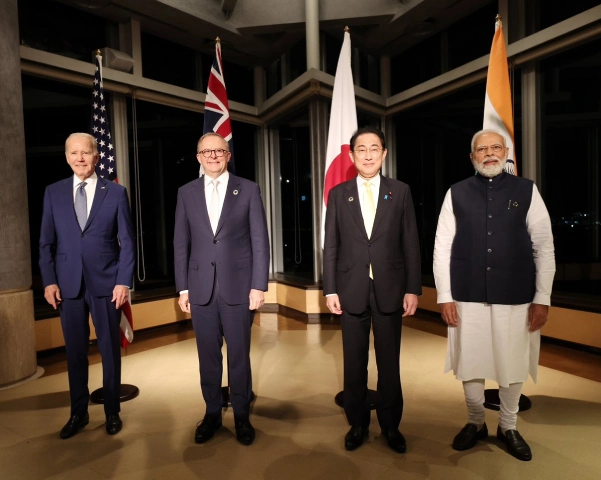

Quad leaders in Hiroshima on sidelines of G7 Summit, earlier this year
Senior army leaders from 35 nations across the Indo-Pacific will come together in New Delhi next week as the Indian Army co-hosts the Indo-Pacific Armies Chiefs Conference, or IPACC, with the United States Army Chief of Staff.
Washington has acknowledged that the fact that India is co-hosting IPACC — with the expected attendance of many of the region’s senior land force officials — is an important milestone for advancing the United States’ multilateral security partnerships in the Indo-Pacific represented by associations such as the Quad.
“Armies in this region are the foundation of the regional security architecture that binds the region together,” General Charles A. Flynn, Commanding General of US Army Pacific, had said the last time Chiefs of Army from across the region went into a huddle during the annual Land Forces Pacific Symposium and Exposition, commonly referred to as LANPAC, in Hawaii in the month of May.
The 47th iteration of Indo-Pacific Armies Management Seminar (IPAMS), the largest land forces event in the Indo-Pacific, will also share the stage with the bi-annual Indo-Pacific Army Chiefs Conference.
The last edition of IPAMS hosted by the Bangladesh Army in September 2022 saw senior army leaders from 24 nations come together to share ideas, build relationships, and even express concerns about the security and prosperity of the region.
With close to 40 nations comprising its make-up, the Indo-Pacific region, dubbed as the world’s most consequential region, covers more than half of the earth’s surface with six of the most populated nations in the world.
The region is inclusive of over 3000 languages and dialects, and poses some of the most pressing security challenges ranging from terrorism to natural disasters. As many as seven of the world’s 10 largest armies are in the region where border disputes and sovereignty concerns are headline events.
With partnerships being key to the landpower network in the Indo-Pacific, the theme for this year’s forum – to be organised in Manekshaw Centre from September 25 to 27 – has been kept as ‘Together for Peace: Sustaining Peace and Stability in the Indo-Pacific Region’.
The Delhi conference will bring senior army leaders and over 150 delegates together to discuss differences, establish trust, mitigate miscalculations, resolve challenges, and find commonality among the participating multinational-professional soldiers.
According to India’s Ministry of Defence, the conference will feature plenary sessions and informal meetings in three tiers: the Army Chiefs conference will discuss issues of mutual interest and areas of cooperation to synergise efforts of all stakeholders for effecting peace and stability in the region; The IPAMS will exchange views on regional security issues and best practices; and, the Senior Enlisted Leaders Forum (SELF) will involve the participation of tactical level sub unit commanders to hold open dialogue, share lessons learned and provide understanding about participating armies.
India will also showcase its ‘Atmanirbhar Bharat’ equipment where the participants will get a glimpse of the country’s growing defence base that has been witnessing transformative changes for the last nine years through progressive reforms.
“The conference will emerge as a testimony to the shared resolve of participating countries and facilitate fruitful discussions. This will allow the partnerships between the participating countries to be further enduring by exchanging views and sharing best practices,” a Defence Ministry statement said Wednesday.
India, which is scheduled to host the next Quad Leaders’ Summit next year, has time and again reaffirmed the importance of the grouping in supporting a free, open, inclusive, and resilient Indo-Pacific.
US President Joe Biden has also described the US-India relationship as being one of the “most consequential” for the 21st century.
A senior Pentagon official said on Wednesday that a shared vision for a free and open Indo-Pacific bolsters the US-India relationship as the two countries continue to strengthen defence ties.
“The major advances that many of us have observed in the US-India relationship are part of a bigger story about what the United States and the Biden-Harris administration has been doing across the Indo-Pacific to advance our strategic objectives, and to come closer to realizing and reinforcing that vision of a free and open Indo-Pacific,” said Siddharth Iyer, the Office of the Secretary of Defence Director for South Asia policy.
Taiwan's Ministry of National Defence (MND) stated that it detected 50 Chinese military aircraft and…
US President Donald Trump is expected to make a decision about whether to take direct…
Prime Minister Narendra Modi and his Croatian counterpart Andrej Plenkovic have noted the importance of…
Israel Defence Forces Spokesperson Brigadier General Effie Defrin on Thursday said that Iran has expressed…
India's Hindustan Aeronautics Limited (HAL) and French engine manufacturer, Safran Aircraft Engines, signed an agreement…
India has emerged as a country with the third-largest growth in power generation capacity globally…